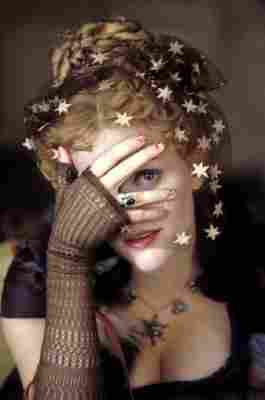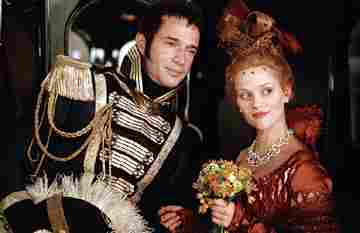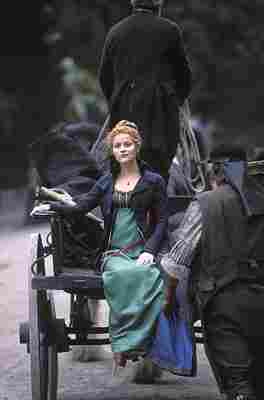Contribute
| Movie Review - Vanity Fair |
Manaswini Garimella
09/22/2004
Starring: Reese Witherspoon, Jim Broadbent, Eileen Atkins, James Purefoy, Jonathan Rhys Meyers
Directed by: Mira Nair
Produced by: Lydia Dean Pilcher, Janette Day, Donna Gigliotti
Whenever an Indian director creates a movie that manages to make it into mainstream American cinema, the Indian community of the United States goes wild, with knowing smiles, and exclamations that “Oh, of course, we are just like everyone else”, feeling, somehow, in their secret heart of hearts, that Bollywood is something of an illusion. Mira Nair, therefore, has always made Indians everywhere proud by making films that have received wide critical acclaim all over the world. Her latest film, Vanity Fair, got so much media hype before it came out, especially in Indian publications, that I can think of few people I know who weren’t keen on seeing how it would be.
I went to see it in the theater about a week after it came out. First of all, the theater I happened to see it at was quite terrible, and I had no chocolate to distract me from the movie, and so therefore I was perhaps a little more critical while viewing it than I usually am. It started off with the typical opening of a movie based on a literary classic, with the rushing horse-drawn carriage in the poorer section of London. It showed Becky Sharp as a young girl, striving to make a point about her character, and how her pluckiness and courage were present even when she was a young child. I liked the girl a lot, and consequently liked the woman she grew up to be in the next scene. I think that it was at this point where Mira Nair completely departed from the classic novel by William Makepeace Thackeray , by giving us a heroine that people liked, instead of a ruthless social climber who cared for nothing other than herself. I think that I have to say that to name this movie Vanity Fair didn’t quite make sense because the infamous vanity that was supposed to be present did not show up clearly.
As I watched Becky grow older, and the movie show her in her various attempts to climb the social ladder , I never really got the impression that she was trying to do anything extraordinary, other than the few instances when she would tell her husband about her plans for them to be accepted into high society, but almost everything she seemed to be doing had hazy intentions. While Reese Witherspoon played the part she had been given well, I had hoped before seeing the movie that she had been given a good complex character that, as her name implies, would have been Sharp. Instead, I saw a rather dull movie, with colors and sets that matched the period, but little in the way of plot, or themes to hold the story together. The transitions were also choppy, and I found that the main problem was the lack of motivation that the characters seemed to have. Everyone seemed to be hazy around the edges, and had trouble finding the point of the whole thing, and there were random threads left off that left me wondering. I think that perhaps the movie was cut short because of time and its budget, and was not able to provide all the back story necessary for the tale, but what it had in its present state was inadequate.
A pretty movie, with colors not unlike those found in Mira Nair’s other films, the only part of its name that Vanity Fair lives up to is the “fair” part. It wasn’t terrible, because Mira Nair is, after all, a good director. I came into the movie with much higher expectations after seeing her previous works, and left sadly disappointed. Perhaps she should stick to making Indian films that are more towards her own experience, because Vanity Fair seemed to lack a lot in understanding, at least for the viewer.
You may also access this article through our web-site http://www.lokvani.com/


